
May 2
1507 Martin Luther ordained:
Without quite intending to, Martin Luther changed the course of Christianity and Western history. His 1517 complaint against specific abuses in the Roman Catholic church—a document now known as the 95 Theses—sparked the explosive Protestant Reformation that swept Europe for the rest of the century. Born to a Roman Catholic family (his father was a copper miner), Luther graduated from the University of Erfurt in 1505 but abandoned his legal studies to enter a monastery devoted to St. Augustine. He was ordained to the priesthood in 1507 and by 1512 was a doctor of theology and a Bible professor at the University of Wittenberg. Luther was a gifted preacher but his theology began to clash with that of the Catholic church . . . .
Luther did not anticipate the uproar touched off by the 95 Theses he sent to a bishop and archbishop to protest "indulgences" being sold by the Catholic hierarchy under Pope Leo X. His controversial beliefs earned him excommunication from the church, but he pressed on with many new followers. Luther produced the first reader-friendly German translation of the Bible and developed a new form of Christian worship that emphasized preaching and popular hymns, permitted the clergy to marry, and honored ordinary life in the world as a field for God's service.
In 1525, Luther married a former nun, Katharina (Katherine) von Bora, sixteen years younger than he. They had six children . . . . Luther's hymn, "A Mighty Fortress is our God" (circa 1529), has been translated into more than 50 languages . . . . It is likely that Luther nailed his 95 Theses to the door of the castle church in Wittenberg, but historians disagree on that story's accuracy . . . [For further details, Click here]
1860 Birth: Theodor Herzl:
Theodor (Binyamin Ze'ev) Herzl (May 2,1860 - July 3, 1904), founded the Zionist political movement. He was born in Budapest in 1860, and educated in the spirit of the German Jewish Enlightenment, as a secular Jew . . . . In 1878 the Herzls moved to Vienna, where Theodor Herzl studied law in the University of Vienna, graduating in 1884. However, rather than studying law, Herzl became a writer, a playwright and a journalist, acting as Paris correspondent for influential liberal Vienna newspaper Neue Freie Presse.
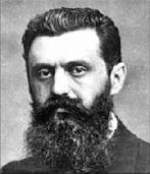
Herzl probably first experienced anti-Semitism while studying at the University of Vienna (1882). He thought of the Jewish problem as a social issue and wrote a play, The Ghetto (1894), about the dilemma of Vienna Jewry, in which assimilation and conversion were rejected as solutions. He hoped that The Ghetto would lead to debate and ultimately to a solution, based on mutual tolerance and respect between Christians and Jews.
In 1894, Captain Alfred Dreyfus, a Jewish officer in the French army, was falsely accused and convicted of treason (See Dreyfus Affair). Mobs shouted "Death to the Jews" in France, the home of the French Revolution and the emancipation of the Jews. Herzl became convinced that the Jews needed a country of their own. Herzl witnessed the Dreyfus affair as a newspaper correspondent. According to conventional accounts, his Zionism resulted from contemplating the persecution of Dreyfus. According to some others, he may have been more influenced by the election of the anti-Semitic Karl Luger as mayor of Vienna.
Herzl concluded that anti-Semitism was a stable and immutable factor, which assimilation would not solve, and which it was futile to combat. Despite ridicule from Jewish leaders, he published The Jewish State (Der Judenstaat) in 1896. Herzl claimed that the Jews could gain acceptance in the world only if they stopped being an anomaly among nations. He asserted that the scattered Jews are one people. Their plight could be transformed into a positive force by the establishment of a Jewish state guaranteed in international (public) law‑-volkerrechtig‑-with the consent of the great powers . . . . Herzl proposed to collect funds from Jews around the world by a company which would work toward settling Jews in Palestine and securing a state. Eventually this idea was transformed into the Zionist Organization, the Jewish National Fund and other organizations. The Jewish State and Herzl's novel, Altneuland (Old New Land) published in 1902, pictured a Jewish social utopia in Palestine . . . . a pluralist, technologically advanced, secular society with equality for Arabs. Altneuland became a symbol of the Zionist vision in the Land of Israel. [For further details, Click here.]
1886 Birth: Gottfried Benn: Germany's foremost expressionist poet and an early, if temporary, supporter of National Socialism. Taking up where Goethe, Nietzsche, and Spengler left off, Benn despised the mechanized world, and railed against rationalism and the political doctrines derived from it. By 1937, however, he had become disillusioned with Nazism and was driven out of the Reich Writers Association. Serving in the German army as a medical officer from 1939 to 1945, his postwar writings revealed the extent of his disillusionment with Nazism and his own vitalist irrationalism, the philosophy that was initially the motivation behind his regrettable flirtation with the Nazis. [See: Is the Sonderweg a Viable Theory?]
1892 Birth: Manfred Freiherr von Richthofen (AKA The Red Baron), in Breslau, German World War I ace:
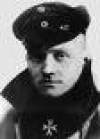
The son of Major Albrecht von Richthofen, a Prussian nobleman and his wife, Kunigunde, he enrolled at age 11 at the military school at Wahlstatt, and then attended the Royal Military Academy at Lichterfelde . . . . He was commissioned in April 1911 in the 1st Regiment of Uhlans Kaiser Alexander III, and promoted to Lieutenant in 1912. Richthofen served briefly in the trenches before transferring to the German Air Force in May 1915. The star pupil of Oswald Boelcke, Richthofen learnt quickly and achieved immediate success. He took his first solo flight after only 24 hours of flight training, on 10 October 1915. A month after receiving his first Albatros, Richthofen had scored six 'kills' against Allied aircraft.
A cool and precise hunter, Richthofen's flamboyance was expressed mainly in his brightly painted aircraft, a Fokker DR-1 Dridecker. His success in the air led to his being named der Rote Kampfflieger by the Germans, le petit rouge by the French, and the Red Baron by the British. Richthofen was appointed commander of the Flying Circus in June 1917. Comprised of Germany's top fighter pilots, the new unit was highly mobile and could be quickly sent to any part of the Western Front where it was most needed. Richthofen and his pilots achieved immediate success during the air war over Ypres during August and September.
After scoring 80 confirmed kills, Richthofen was finally shot down as he flew deep into British lines in pursuit of Wilfrid May on 21 April 1918. Although Canadian flyer Arthur 'Roy' Brown - who was flying to May's aid - was officially credited with the victory, controversy remains over who actually shot Richthofen down; other evidence suggests he was hit by a single bullet fired by Australian gunners in the trenches. In any event, Manfred von Richthofen crashed into a field alongside the road from Corbie to Bray. He was 25. He was survived by his brother Lothar, also a noted ace. A British pilot flew over the German aerodrome at Cappy and dropped a note informing the Germans of Richthofen's death. Buried in France by the British with full military honours, Richthofen's body was later exhumed and reburied in the family cemetery at Wiesbaden. [For the source site, Click here.]

1915 World War I: Various:
List Regiment: Gefreiter Adolf Hitler's 16 Reserve Infantry Regiment occupy a position, at Fromelles (pictured above in a drawing by Hitler), which is on a level field with water channels, willow trees and willow stalks, in the distance towards the enemy lines lie an insignificant wood with barbed wire entanglements. Under the direction of their defense-minded commander, Lieutenant General Gustav Scanzoni von Lichtenfels, the regiment works ceaselessly day and night in the subsequent weeks, to further fortify their position at Fromelles. [For further details, Click here.]
The Battle of Gorlice-Tarnow begins:
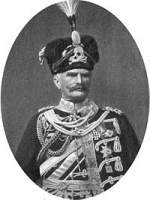
General August von Mackensen: To the complete surprise of the enemy, large movements of troops into West Galicia had been completed by the end of April. These troops, subject to the orders of General von Mackensen, had been assigned the task in conjunction with the neighboring armies of our Austrian ally of breaking through the Russian front between the crest of the Carpathians and the middle Dunajec. It was a new problem and no easy undertaking. The heavens granted our troops wonderful sunshine and dry roads. Thus flyers and artillery could come into full activity and the difficulties of the terrain, which here has the character of the approaches of the German Alps, or the Horsal hills in Thuringia, could be overcome. At several points ammunition had to be transported amid the greatest hardships on pack animals. [For German Press Statement Click here]
Crown Prince Rupprecht tells his diary: "These bombings of cities which both sides are now engaging in, are barbarous nonsense."1916 World War I: List Regiment: Gefreiter Adolf Hitler endures trench warfare in Flanders (Artois) with 3 Company, 16 Reserve Infantry Regiment. [For further details, Click here.]
1917 World War I: List Regiment: Gefreiter Adolf Hitler's 16 Reserve Infantry Regiment, 3 Company, participate in the Arras action, being redeployed east of Vimy Ridge. [For further details, Click here.]
1918 Various:
World War I: Allies argue over U.S. troops joining battle on Western Front. [For further details, Click here]
Austria: Walter Riehl is elected chairman of the Austrian DAP (German Workers Party) and moves to Vienna. (THP)
[See: Austria: The Other Germany.]1931 Volkishness: Otto Rahn visits the castle of Montsegur in France, spending three months carefully exploring the local caves and grottos in search of the Holy Grail. (THP)
1933 Various:
Gleichschaltung: On the day after May Day, Hitler orders all independent and Socialist trade unions in Germany closed down and dissolved. The remains are united into the German Labor Front (DAF). (THP)
National Socialism, which today has assumed leadership of German labor, can no longer bear the responsibility for leaving the men and women of the German working class, the members of the largest trade Organization in the world, the German trade union movement, in the hands of people who do not know a fatherland called Germany. Because of that, the National Socialist Factory Cell Organization has taken over the leadership of the trade unions. The NSBO has eliminated the former leadership of the free trade unions of the General German Trade Unions League, and of the General Independent Employees' Federation. On 2 May 1933 the NSBO took over the leadership of all trade unions; all trade-union buildings were occupied and most stringent control of financial and personnel matters of the organizations has been setup. (National Socialist Party Press Agency)
[See: How Did Adolf Hitler Consolidate his Power?]Church and Reich: The central board of the Association of Catholic Young men decides that "the fact of belonging to the Jungmaennerverein in principle does not rule out membership in the NSDAP, including its various formations (SA, SS etc.)." Soon afterward, the Nazi party forbids simultaneous membership in Catholic and National Socialist organizations. (THP)
[See: Was Adolf Hitler a Christian?]Germany outlaws the German Communist Party (KPD).
Prussia's Administrative Court rules that the Gestapo is no longer subject to judicial control.
1935 May 2-6: France and the Soviet Union sign the Pact of Mutual Assistance, to provide for cases of unprovoked aggression. Hitler says it is obviously directed at Germany.

1936 Abyssinian Emperor Haile Selassie and his family flee Addis Ababa, three days before its capture by the Italians. Addis Ababa is looted and set afire by mobs.
1938 Austria: The Gestapo orders the Jewish community offices in Vienna reopened.
1941 World War II: Iraq: Following a coup d'état, a pro-Nazi Government is formed. British airport in Habaniya is attacked by Iraqi troops.
1942 World War II: HMS Edinburgh is sunk in the Barents Sea off Norway. Its cargo of gold bars will lay in 830ft of water, until salvaged in 1981.
1945 World War II: Various:
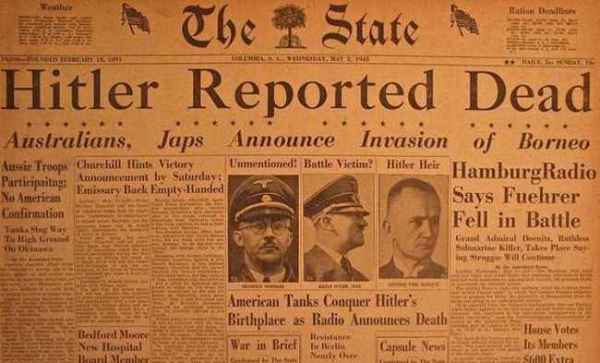
Stalin to Truman:
The Soviet Supreme Command has given instructions that whenever Soviet troops contact Allied troops the Soviet Command is immediately to get in touch with the Command of the US or British troops, so that they, by agreement between themselves, (1) establish a temporary tactical demarcation line and (2) take steps to crush within the bounds of their temporary demarcation line all resistance by German troops.


World War II: Death: A few days after killing the six Goebbels children—as well as Hitler's dog, Blondi—SS doctor Ludwig Stumpfegger (above, right), Adolf Hitler's personal physician since 1944), commits suicide at the Lehrter Bahnhof by taking cyanide alongside Martin Bormann (above, left, with his skull in the middle) while fleeing Berlin.

I saw the Reichsleiter, the former Reichsleiter Martin Bormann, on the night of 1-2 May 1945 near the Friedrichstrasse railroad station, at the Weidendammer Bridge. Reichsleiter Bormann (former Reichsleiter Bormann) asked me what the general situation was at the Friedrichstrasse station . . . . He asked me what the situation was and whether one could get through there at the Friedrichstrasse station. I told him that was practically impossible, since the defensive fighting there was too heavy. Then he went on to ask whether it might be possible to do so with armored cars. I told him that there was nothing like trying it.
Then a few tanks and a few SPW (armored personnel carrier) cars came along, and small groups boarded them and hung on. Then the armored cars pushed their way through the antitank trap and, afterwards, the leading tank‑-along about at the middle of the tank on the left-hand side, where Martin Bormann was walking‑-suddenly received a direct hit, I imagine from a bazooka fired from a window, and this tank was blown up. A flash of fire suddenly shot up on the very side where Bormann was walking . . . at the middle of the tank, on the left-hand side.
Then, after it had got 40 to 50 meters past the antitank trap, this tank received a direct hit, I imagine from a bazooka fired from a window. The tank was blown to pieces right there, where Martin (Reichsleiter Bormann) was walking. I myself was flung aside by the explosion, and by a person thrown against me who had been walking in front of me‑-I think it was Standartenfuehrer Dr. Stumpfecker‑-and I became unconscious. When I came to myself I could not see anything either; I was blinded by the flash. Then I crawled back again to the tank trap, and since then I have seen nothing more of Martin Bormann . . . .
I still saw a movement which was a sort of collapsing [Martin Bormann collapsed in the flash of fire]. You might call it a flying away . . . . I assume for certain that the force of the explosion was such that he lost his life.

Nuremberg Tribunal: US President Truman appoints Robert Jackson as chief US counsel for the prosecution of Nazi war criminals. The Executive Order:
Associate Justice Robert H. Jackson is hereby designated to act as the Representative of the United States and as its Chief of Counsel in preparing and prosecuting charges of atrocities and war crimes against such of the leaders of the European Axis powers and their principal agents and accessories as the United States may agree with any of the United Nations to bring to trial before an international tribunal...
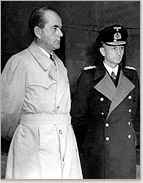
World War II: Albert Speer, participating in what he will later call Doenitz's 'operetta government,' is appointed Minister of Economics and Production. After obtaining a signed order from Doenitz to stop all demolition activities, he travels to Hamburg to make a live radio broadcast on the subject to the nation. (Read)
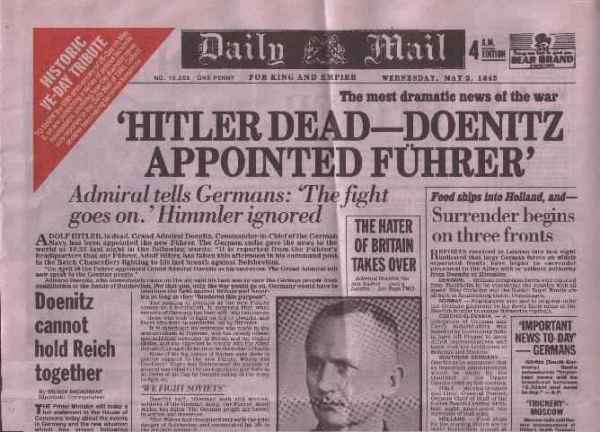
I remained in Berlin, in violation of the order which I was given. When Hitler and his entourage took the way of suicide or fled toward the West, I was, to my knowledge, the only higher official to remain in Berlin. At that time I gathered together the employees of the highest Reich authorities, who had been left to their fate, in the ruins of my office. Hitler had left behind an order to fight on. The commander of Berlin could not be found. Therefore, as a civilian, I felt obliged to offer to the Russian Marshal Zhukov the capitulation. As I was sending off the emissaries who were to go across the battleline, the last military adjutant of Hitler appeared—General Burgdorff—and was going to shoot me in compliance with Hitler's order.
Nevertheless, we capitulated, even though it was signed by the commander, who had been found in the meantime. Thus, I believe I kept my oath, the oath which I had taken to the German people in the person of Hitler... The fact was that Hitler tried to use this defeat for the extermination of the German people, as Speer has now horribly confirmed and as I was able to observe during the last phase of the conflict in Berlin when, through deceit by raising false hopes, boys of 15, 14,13, and l2 years of age were equipped with small arms to fight against tanks and called into battle, boys who otherwise might have been the hope for future reconstruction. Hitler found escape in death, leaving behind him the order to keep on fighting. He also left behind him the official report that he had died in battle. I learned that he had committed suicide; and thus my last public statement, on 2 May 1945, was to let everybody know of this suicide, for I wanted to kill a Hitler legend in the bud.

World War II: As Berlin falls to the Soviet Army, rocket scientist Werner von Braun and over 100 of his team flee to the relative safety of the American front. His brother and fellow rocket engineer, Magnus, spotting an American private from the US 44th Infantry Division, addresses the soldier in broken English: "My name is Magnus von Braun. My brother invented the V-2. We want to surrender." (Braun)
From The Day the War Ended by Martin Gilbert:On May 2, at Oberammergau, in southern Germany, American troops were approached by three German civilians, who gave themselves up. The first to reach them, and to explain who he was, was Dr Herbert Wagner, one of Germany's leading guided missile designers. With him were two senior members of the Peenemünde rocket research staff, Wernher von Braun and General Walter Dornberger. These were the men whose technical expertise had created the rocket bombs that had recently fallen on London and Antwerp, killing thousands of civilians.
The three men were hurried to Paris, and then to the United States. "We were interested in continuing our work," von Braun later wrote, "not just being squeezed like a lemon and then discarded." They may have been squeezed, but they were not discarded. A direct line of cause, effect and personnel was to run between the encounter at Oberammergau and the American Apollo ... project which landed the first human beings on the moon twenty-four years later.
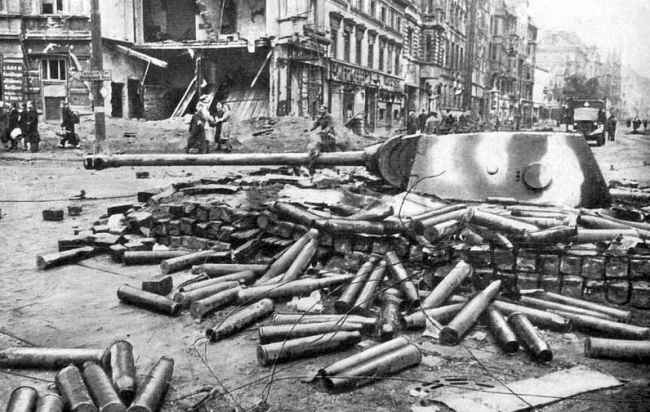

World War II: Rochus Misch, Helmuth Weidling, Hans Refior, Theodor von Dufving, and Siegfried Knappe take their final leave of the Fuehrerbunker. Generals Burgdorf and Krebs, SS Captain Schedle, and SS Lieutenant Stehr take their final leave of life by committing suicide. Only Erna Flegel, Werner Haase, and Johannes Hentschel remain hiding in the Fuehrerbunker. (Sereny)

World War II: The Soviets capture what's left of the Reich Chancellery in Berlin. The remains of Hitler, Braun and two dogs (thought to be Blondi and her offspring Wulf) are discovered in a shell crater by Ivan Churakov of the 79th Rifle Corps. (Above: The empty gasoline cans utilized in the cremation attempts.) General Weidling, defense commandant of Berlin, surrenders the city to the Soviets. The Soviet Union announces that Berlin has surrendered to the 1st White Russian and 1st Ukrainian armies. Note: 80,000 men were killed taking Berlin, 275,000 wounded or missing in the lead up to the battle and in the battle itself. Two thousand Soviet tanks destroyed, 150,000 Germans killed.
German troops in Italy surrender to the Allies:
Approximately 1 million German soldiers lay down their arms as the terms of the German unconditional surrender, signed at Caserta on April 29, come into effect. Many Germans surrender to [Japanese American soldiers]. Among the American tank crews that entered the northern Italian town of Biella was an all-Nisei (second-generation) infantry battalion, composed of Japanese Americans from Hawaii.
Eagle's Nest: A mysterious SS convoy leaves the Berghof (Hitler's Eagle's Nest). Later that night, members of this SS detachment bury several crates and metal boxes at the foot of the Schleigeiss glacier. (THP)
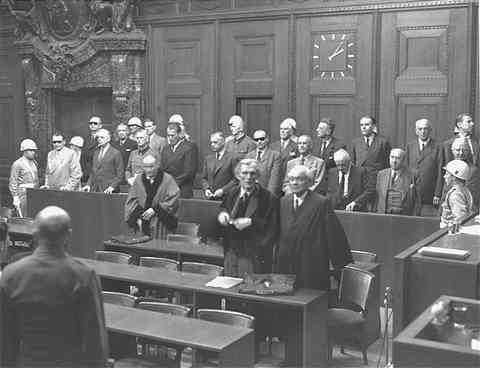
1946 Nuremberg Tribunal: On day 120, Hjalmar Schacht is cross-examined by the Prosecution:
Mr. Justice Jackson: Now, if we return to the Four Year Plan which began in 1936, as I understand it you opposed the appointment of Goering to have charge of the Four Year Plan on two grounds: First, you thought that that new plan might interfere with your functions; and secondly, if there were to be a Four Year Plan, you did not think Goering was fit to administer it?
Schacht: I do not know what you mean by "opposed." I was not satisfied with it and considered the choice of Goering not the right one for any leading position in economics.
Mr. Justice Jackson: As a matter of fact you have described Goering as a fool in economics, have you not?
Schacht: Yes, as one does say such things in a heated conversation.
Mr. Justice Jackson: Or in interrogation?
Schacht: Interrogations are also sometimes heated.
Mr. Justice Jackson: Now, very soon Goering began to interfere with your functions, did he not?
Schacht: He tried it repeatedly. [For the rest of Schacht's testimony, Click here.]
1952 Spandau Prison: Albert Speer (serving a 20-year sentence for Crimes Against Humanity), hearing that his friend, Annemarie Kemp, has been lobbying people in Bonn and elsewhere to secure his early release, writes her a letter and arranges for it to be smuggled out:
My dear Annemarie Kemp, I really am touched to read how energetically and loyally you are extending yourself for me. Just don't be disappointed if it doesn't work; I don't have great hopes . . . . There is no reason not to speak openly with Leni [Riefenstahl], of course not mentioning [our clandestine way of communicating]. She is grateful to me for many things and I think will gladly help. (Sereny)
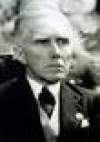
1969 Death: Franz von Papen: German diplomat and politician, first with the Center Party, later an independent. The penultimate Reich chancellor of the Weimar Republic (Cabinet of the Barons). Helped Hitler oust Reich Chancellor Schleicher. Was nearly killed during the Blood Purge, saved only through Goering's personal intervention. Under Hitler, Papen became vice chancellor, then ambassador in Vienna, and afterwards in Ankara. Acquitted during Nuremberg trials. Later sentenced to eight years in a labor camp by German authorities, but released in 1949. Subsequently, he unsuccessfully attempted to justify his role in the Nazi regime.
1951 Germany is admitted to the Council of Europe as a full member.
1957 Death: Joseph McCarthy: Departed to hunt Reds in warmer climes:
Senator Joseph McCarthy (R-Wisconsin) succumbs to illness exacerbated by alcoholism and passes away at age 48. McCarthy had been a key figure in the anticommunist hysteria popularly known as the "Red Scare" that engulfed the United States in the years following World War II. [For further details, Click here]
1972 Death: J. Edgar Hoover: End of an era at the FBI:
After nearly five decades as director of the Federal Bureau of Investigation (FBI), J. Edgar Hoover dies, leaving the powerful government agency without the administrator who had been largely responsible for its existence and shape. [For further details, Click here]
Edited by Levi Bookin (Copy editor)
levi.bookin@gmail.com



Click to join 3rdReichStudies


Please note that the list-owner and the moderator are not responsible for, and do not necessarily approve of, the random ads placed on our pages by our web server. They are, unfortunately, the price one pays for a 'free' website.
FAIR USE NOTICE: This site may contain copyrighted material the use of which has not always been specifically authorized by the copyright owner. We are making such material available in our efforts to advance understanding of historical, political, human rights, economic, democracy, scientific, environmental, and social justice issues, etc. We believe this constitutes a 'fair use' of any such copyrighted material as provided for in section 107 of the US Copyright Law. In accordance with Title 17 U.S.C. Section 107, the material on this site is distributed without profit to those who have expressed a prior interest in receiving the included information for research and educational purposes. If you wish to use copyrighted material from this site for purposes of your own that go beyond 'fair use', you must obtain permission from the copyright owner.